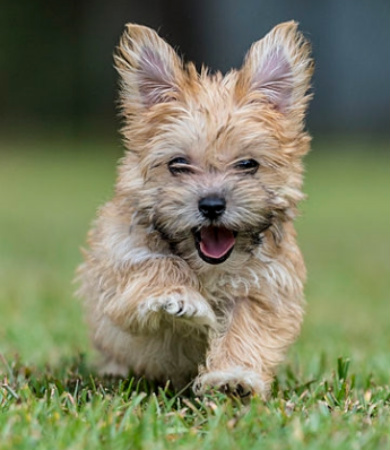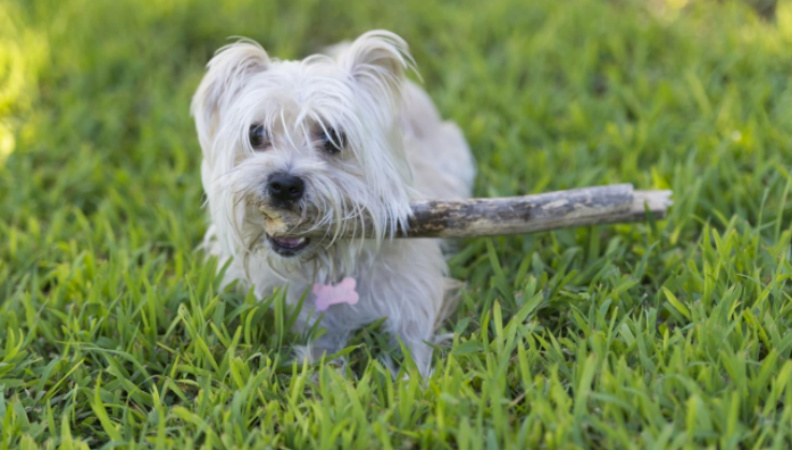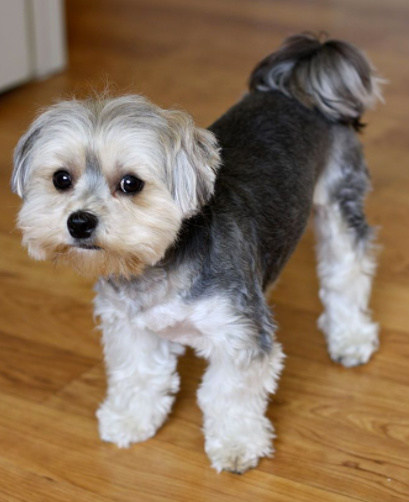Morkie Dog Breed Temperament Information – Diet and Training
The Morkie Dog – Its Character and Suitability
Morkie is one of the most popular designer bred dogs. The Morkie is a cute and adorable crossbreed who gets along well with other pets. It is a small sized dog because it is half Maltese and half Yorkshire Terrier. Due to cross breeding, undesirable traits of both parents would have been eliminated. So what you have in your hands will be a Morkie with the best of both parents.

Like most small dogs, Morkies love to play with dog toys. Being good with children, the Morkie makes the ideal family dog. However, this does not mean that the Morkie is for all families. Families with small children should educate the kids to handle the Morkie with care. And if you are looking for a big dog, the Morkie is not for you.
Life Expectancy of Morkie
The average lifespan of a Morkie is between 10-16 years.
Origins of Morkie
The Morkie has got super cute parents. It is a cross between two popular small dogs, the Maltese, and the Yorkshire Terrier. Some call the it the “Morkshire Terrier”. The Morkie originated from the United States and Canada. The first Morkies surfaced in the 1990’s and had hanging ears and silky coat. Morkies have both traits of the Maltese and The Yorkshire Terrier.

Morkie Parents: The Maltese and The Yorkshire Terrier
The Maltese
The Maltese dog is also known as the “ancient dog of Malta”, the “Roman Ladies’ Dog” and “Melita”. The exact origin of the Maltese is not established. However, some believe that the breed originated from Asia as it is related to the Tibetan Terrier. Early Malteses were believed to be used as rodent controllers. The Maltese has been around for a long time. There were evidence of its existence on Greek amphora dated 500 BC.
Malteses warmed the hearts of the English in the 1500s. However, attempts to create a smaller version of the Maltese almost eliminated the breed between the 1600s and 1700s. The Maltese came to the shore of the United States in the 1800s.
Malteses are extremely lively and playful. Even at older ages, the energy of the Maltese hardly fades. This probably explains why Morkies are full of energy too. The coat of the Maltese is long and silky. The color of the coat is pure white. Its outgoing personality makes it a very sociable dog.
The Maltese is also a very clever dog that prefers positive reinforcement. He can be stubborn and wants his own way. But through patience and repetition, malteses can be obedient companions for many years.
Sadly, it is also the most dumped dog. Research in Australia found that maltese owners are more likely to dump their dogs. The main reason they cited was the constant barking of their malteses. We strongly condemn such dumping of dogs. Dog are born to bark. If one cannot tolerate barking, then he should never own a dog.
The Yorkshire Terrier
In the early days, The Yorkshire Terrier was tasked to catch rats and mice around mills. The breed originated in Yorkshire, England. Scottish workers who came to Yorkshire brought along with them small terriers which eventually became the forefathers of the Yorkshire Terrier.
In the early days, the classification of the breed were hazy. It was described that “almost anything in the shape of a Terrier having a long coat with blue on the body and fawn or silver coloured head and legs, with tail docked and ears trimmed, was received and admired as a Yorkshire Terrier”. It was not until a dog named Huddersfield Ben came along that the breed established its recognised features.
The Yorkshire Terrier coat is to be glossy, fine, straight and silky. Yorkshire Terriers shed very little. They are very protective and attraction seeking. Their affection for human love is unquestionable. Yorkshire Terriers tend to associate better with their human owners than other dogs. Being an alert and barky dog, Yorkshire Terriers are suitable for the role of watchdogs.
Together, the Maltese and Yorkshire Terrier will produce an offspring that has all the positive traits. That explains why the Morkie is such a lovable designer dog. Always seeking their owner’s attention, Morkies have an incredible loyal following around the world.
Summary of the Morkie Breed
| Average height | 6 to 9 inches |
| Average weight | 6 to 9 pounds |
| Coat type | Fine, long, silky, straight |
| Hypoallergenic? | Can be |
| Grooming Needs | Moderate to high |
| Shedding | Low or None at all |
| Brushing | Daily |
| Loyalty | Unquestionable when trust is established |
| Tolerant to Solitude? | Separation anxiety Prone |
| Barking | Occasional But Lack of Exercise lead to non-stop barking |
| Tolerance to Heat | Moderate |
| Tolerance to Cold | Low to moderate |
| Good Family Pet? | Very good |
| Good with Children? | Good with older children (younger children need guidance) |
| Good with other Dogs? | Good with socialization |
| Good with other Pets? | Good with socialization |
| A roamer or Wanderer? | Low to moderate |
| A Good Apartment Dweller? | Excellent |
| Good Pet for new Owner? | Very good to excellent |
| Trainability | Easy |
| Exercise Needs | Fairly active |
| Tendency to get Fat | Moderate |
| Major Health Concerns | Patellar luxation, eye problems, liver problems, hypoglycemia, Collapsed trachea, |
| Other Health Concerns | Reverse sneezing, white dog shaker syndrome, |
| Life Span | 10 to 16 years |
Morkie Temperament and Character
Most hybrid dogs take their characteristics and personality traits from their parents. Morkies are no exceptions. The Yorkshire Terrier and Maltese are well known for their air of personality.
If left uncontrolled, Morkies can demand lots of attention from their owners. They can get very attached to their owners and in extreme cases, suffer from separation anxiety. As they are very “barky”, some Morkies can bark throughout the day till their owners come home. If you can have someone to be at home most of the time, it will be ideal.
When socialised well, Morkies love to run up to other dogs to make friends. However, just be careful when your Morkies sniffs up to a much bigger dog. Accidents do happen and if there is an unexpected attack, the smaller size of your Morkie will be a major disadvantage. Try to stick to smaller sized dogs for your Morkie.
Generally, the Morkie is an easily excitable dog who is also a perfect lap dog when you watch your drama series from the comfort of your sofa set. Your Morkie will follow you around the house. Once you gain the trust of your Morkie, he will be a great companion.
Morkie Food and Diet
Morkies are small dogs but they are big eaters. They can overeat, resulting in weight issues. An overweight Morkie will have problems with their heart, internal organs and its bone joints. Thus, it is important not to overfeed them. Common sense tells us not to feed them table scraps as those leftovers tend to be less nutritious.
Kibbles are great for Morkies because they are prone to dental issues. The consumption of dry kibbles will ensure that their teeth get sufficient exercise and stimulation. In addition, the dry food will help to lessen the occurrence of cavities, slowdown plaque buildup, reduce gum infections and tooth loss, thereby minimising bad breath.
Not all dog kibbles are the same. Read the labels before buying. Some of the most trusted dog food brands is Acana dog foods. You can see lots of testimonials here.
Do not change the brand or content of the kibbles too often. As Morkies have sensitive stomachs, changing their food mix too often can cause serious stomach upset. Your Morkie can end up with having diarrhea and vomiting.
There are dog owners who prefer to feed their Morkies with home cooked food. After all, all those processed foods do come with unwanted additives or gelling agents. Here are some foods that you can prepare for your Morkie:
- Lean Cooked Meat – Remember NO FATS!
- Carrots – Dogs love them cooked slightly!
- Peanut Butter – Great source of protein
- Bananas – One of the best quick and nutritious fixes
- Apples – Remember to remove the seeds and core
- Blue Berries
- Eggs – Hard boiled
- Sweet Potatoes
- Boiled Pumpkin
The above foods should be fed with moderation. Any excessive consumption of each food item is bad for your Morkie.
While these are foods are suitable for your Morkie, there are certain foods that you must avoid at all costs. Here are some of the foods that should be avoided:
- Alcoholic Drinks – Morkies do not need to chill that Much!
- Avocado
- Candy and gum
- All forms of Chocolates
- Coffee or Caffeine Drinks
- Fatty Meat and cooked bones
- Grapes and Raisins
- Macadamia Nuts
- Human medication
- Rotten foods
- Onions and Garlic
- Raw eggs
- Yeast Dough
Training your Morkie
It is important for you to train your Morkie well. A spoilt or untrained Morkie can wreak havoc in your home.
The good news is, Morkies are highly intelligent dogs. They are easy to train but require a lot of patience. Their natural stubbornness can be a major stumbling block for impatient owners.
Always use positive reinforcement and reward at the right moment. Clicker training is highly recommended.
Morkies are very intelligent dogs. The timing of your reward during training is very important. Never punish your Morkie when it comes at your calling. That will remove the trust between you and your Morkie very quickly.

Morkies enjoy games and training. They need mental stimulation to maintain good behavior and well being. While some insist that running around the house is ample exercise for a Morkie, letting them have a good outdoor run does not hurt. Morkies can become destructive and aggressive if left with little exercise. You run the risk of having your sofa destroyed.
Allowing them to have some outdoor adventures will build expose them to external stimulants, allowing them to feel more balanced. A short but quick walk in a nearby park once a day will be good enough. However, if the weather is too cold, it’s wiser to leave your Morkie at home.
Performing tricks and getting a treat in return is a major turn on for Morkies. They can do all kinds of tricks you teach them to. The video below shows Ben The Morkie performing different tricks like paw and roll over:
Morkie Weight, Height and Coat
The Morkie weights between 4 to 9 pounds and is generally 6 to 9 inches tall at the withers. Morkies have a very soft coat that is long and flowing. The color of the coat varies from white, brown, black or shade of apricot skin. Their coat can turn greyish as they age.

The Morkie, similar to many toy breeds, has a small bone structure. Their ears tend to be pointed or flop over. Morkies have small muzzles and black noses. But white puppies tend to look more like Malteses, while mixed colored puppies tend to look like Yorkshire Terriers.
As Malteses and Yorkshire Terriers shed very little, Morkies do not shed much. You will not find yourself having to clear off clumps of dog hair off the sofa. However, their coat gets tangled up easily. It is advisable to comb and brush their coat daily to prevent any hair tangles or matting.
Morkie Exercise Requirements
Morkies are small dogs that are full of energy. However, do not deprive your Morkie of physical exercise. If you stay in an apartment, it is advisable to bring your Morkie out for a brisk walk. Never let your Morkie walk off leash when nearing public roads. Unless your Morkie is well trained, any unexpected misadventure can end up in tragic consequences.
If you stay in a landed house with a back yard, playing ball with your Morkie can be a real treat for your dog.
Physical exercises help keep your Morkie fit and free from health problems. A lack of exercise will result in a bored and frustrated Morkie. And a frustrated Morkie will bark non-stop in the house. A frustrated Morkie can dig continuously till its paws bleed or rip your house furniture apart.
Morkie Grooming
Besides combing and brushing your Morkie, it is important to send your Morkie for regular grooming sessions. The hair around your Morkie’s eyes need to be kept clean daily. The dirt around the eyes and the stubborn tear stains need to be gently wiped away with a wet soft cloth. If the tear stains are too stubborn, use a dog friendly tear remover. Your Morkie will thank you greatly for it.
Like other dogs, having healthy teeth is very important for your Morkie. To prevent tartar buildup, it is important to brush your Morkie’s teeth at least 2 times a week. Tooth decay can cause many problems for your Morkie, not to mention the additional monetary damage to your pockets.
If you are grooming your Morkie yourself, pay attention to the hair around the feet, legs and near the tail. These are places where their hair tend to tangle up. Make sure you give them a quick wipe down after playing in the park or your backyard. Morkies are very active and tend to attract different insects and fleas. If left unattended, such pests can be costly to remove.
Clip your Morkie’s nails when they get too long. Nails left too long will hurt your Morkie as he walks around the house. Pay attention to your Morkie’s ears too. Any discharge from the ear is a sign of an ear infection. Swollen and red ears need to be attended to quickly. Such situations can be avoided if you clean your Morkie’s ears at least twice a week.
Use a quality shampoo and conditioner when you bath your Morkie. Rinse away all the shampoo and conditioner thoroughly. Some of the best dog shampoos and conditioners can be found here.
Morkies and Your Family
As Morkies are small dogs, they need to be handled with care. They do very well with older children who understand the need to be delicate with your Morkie. Some younger kids can get too rough with your Morkie and injure it accidentally.
However, that does not mean that Morkies are not suitable for families with small kids. The key is to educate your younger kids on how to properly play and handle your cute Morkie. Pet safety should be taught at a young age. Let your kids know that your Morkie is not just a small dog but an important family member too. The importance you place on your Morkie will determine how your kids treat your dog.
Is The Morkie Recognised?
Morkies are not recognised by The American Kennel Club. But they are recognised by the International Designer Canine Registry and Designer Dog Registry. Recognised or not, the Morkie is a lovable dog!
Morkie Health Concerns
Before acquiring your Morkie, it is important for you to conduct a background check on its parent dogs’ health history. Many health conditions are passed on due to irresponsible breeders. Never buy a Morkie from puppy mills. Walk away from any shop that refuses to show you detailed health history of the parent dogs.
Morkies need to go for their routine checkups and vaccinations. Some common health ailments of Morkies include cataracts, tracheal collapse, glaucoma, heart diseases, liver problems, Hypoglycemia, portosystemic shunt, Patellar Luxation and White dog shaker syndrome.
As you can see there are many conditions a Morkie is susceptible to. Thus, it is important for you to buy from trustworthy Morkie breeders. Doing your research and groundwork before making a purchasing decision can save you years of trouble in future.
What is the Cost of Morkie Ownership?
As Morkie is considered a designer bred dog, the purchase price can be quite high. It ranges from $900 to $3800 for a Morkie puppy. Morkie puppies are popular and reputable breeders are hard to find. Besides the initial purchase price, you have to budget for essential items like a crate, carrier bag, feeding bowls, dog toys, dog beds, dog collar and leash, dewormer tablets, blood tests, micro-chipping, neutering and vaccination costs. These can add up easily to almost $500.
Ongoing costs include your Morkie’s daily food, treats, medical checkups, insurance, grooming, de-ticking and annual licensing costs. Such costs vary, depending on your country of residence.
Costs aside, the companionship you have with your Morkie cannot be measured in dollars and cents. At Platpets, we believe every pet is part of the family, in sickness and in health.

Love your article lots of good information.
My morkie is 8 years old I got her from SPCA with no information she weighed 1 lbs. How much should she eat
Great advise she a typical morkie but has found her voice and bark’s at the least noise ,3months old now adorable love her to bits . Had toy poodle 18yr old when we got Suzie q , sadly 4wks later we lost him devastating but Suzie Q brought us through xxcarol
I believe my 3 yr. Old Morkie is nuts! Have had her for about a month now and will not listen to anything. How do I get her to: sit-stop (or slow down her barking) I want to let her roam the living room, there are pads but she’ll go on the carpet. Any help is appreciated. Fred
My fur baby is 7 months, she is afraid of shadows, nite time noises, people, dogs every thing??? Help